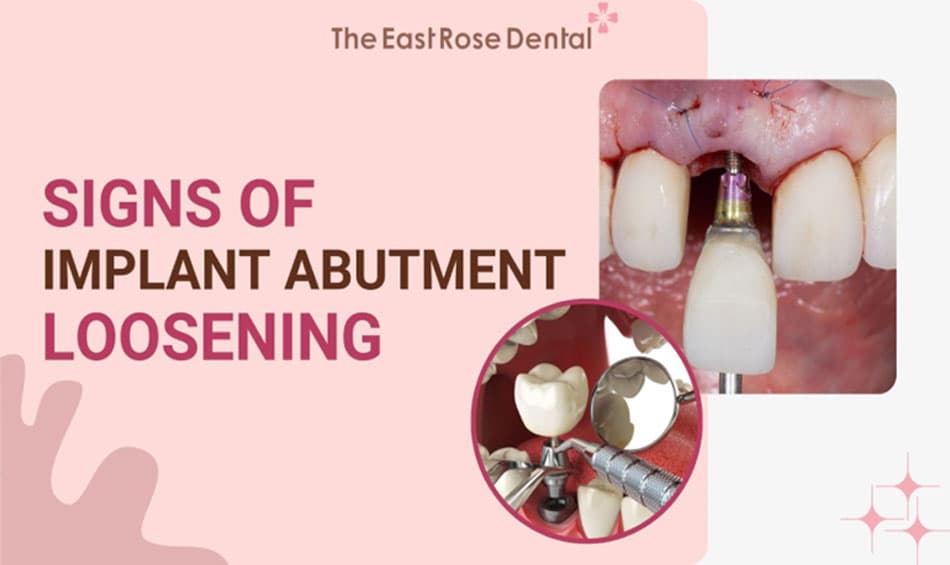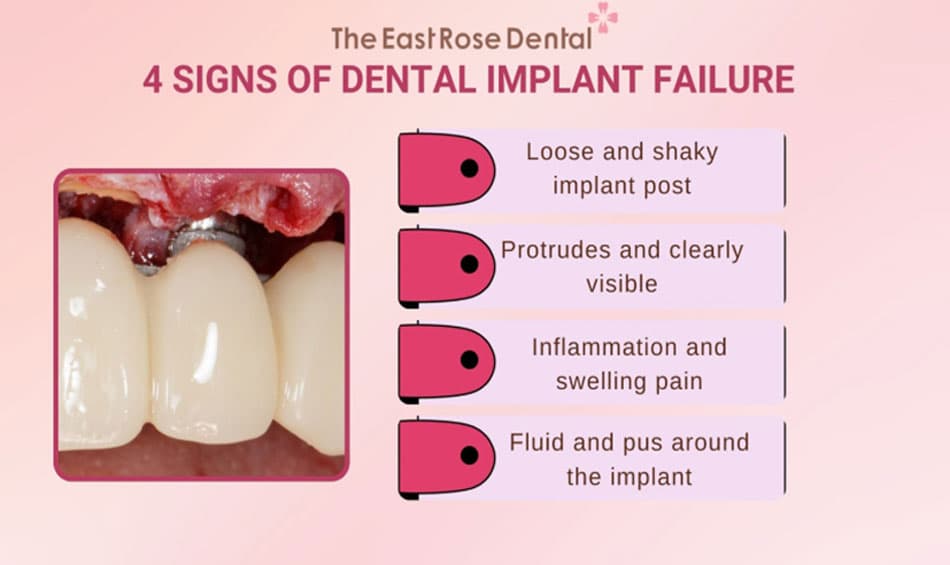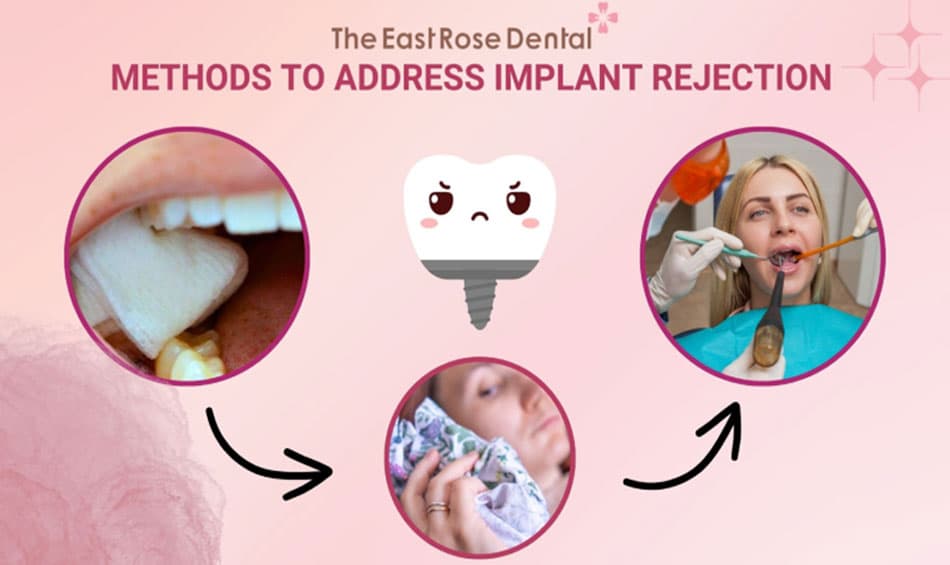4 Signs of Implant Abutment Loosening - Causes and Solutions
Implant placement is an excellent solution for restoring functionality to missing teeth, but success isn't guaranteed every time. Detecting signs of implant abutment loosening helps you promptly seek timely treatment and minimize unwanted complications. In this article, The East Rose Dental Clinic will provide early detection signs and solutions to address this issue.

What is dental implant abutment restoration method?
The dental implant abutment restoration method is an advanced dental technique that effectively and long-lastingly restores lost teeth. Implant abutments are usually made from biocompatible titanium materials, implanted into the jawbone to replace missing tooth roots. After integrating with the bone over time, these abutments provide a sturdy foundation for artificial teeth or dental bridges.
The advantages of this method include restoring natural chewing function, preventing jawbone resorption, and maintaining facial structure. The implantation process requires high technical skill and meticulous care, but it yields superior aesthetic and functional results, enhancing the quality of life for patients.
Common Causes of Implant Abutment Loosening
Dental implant abutment placement is not always a guaranteed success. Several factors can lead to implant abutment loosening, resulting in unwanted complications. Below are the primary reasons for implant abutment loosening.
Implantation Technique
The technique and experience of the dentist play a crucial role in accurately and effectively placing dental implants. If the procedure is not performed correctly, it can lead to various complications such as:
- Incorrect positioning of the implant abutment, resulting in inadequate stability or damage to surrounding tissues. Consequently, the implant abutment fails to integrate properly with the jawbone and may loosen.
- Additionally, choosing the wrong type of implant or not carefully assessing the patient's jawbone condition also increases the risk of failure and loosening.
Customer-related Factors Affecting Implant Abutment
Implant abutment loosening often results from customer-related factors. Here are common reasons affecting implant abutments after treatment:
- Non-compliance with oral hygiene instructions after implant placement: Infection is a primary cause due to improper oral hygiene or failure to follow post-implantation instructions from the dentist. This can lead to infections around the implant area, preventing proper integration with the jawbone and causing abutment loosening.
- Sensitivity to implant abutment materials: Some individuals may be sensitive or allergic to these materials, leading to inflammatory reactions and abutment loosening.
- Jawbone resorption: Insufficient bone density or thickness can prevent the implant abutment from securely integrating, causing instability and the risk of loosening.
- Chronic diseases: Chronic conditions such as diabetes, cardiovascular diseases can impair wound healing and affect the accuracy of implant integration into the jawbone.
- Smoking during recovery: Smoking not only reduces blood flow to the implant site but also inhibits wound healing and tissue regeneration. This complicates the integration of the implant abutment with the jawbone, increasing the risk of loosening and post-treatment abutment failure.
- Trauma or strong impact on the implant: If the implant is subjected to trauma during the osseointegration process due to accidents or biting and chewing on very hard objects, it can affect the recovery process and, in severe cases, prevent the new implant from integrating properly.
4 Alarming Signs of Implant Abutment Loosening

Implant abutment loosening is a concerning issue that requires timely detection and resolution. Understanding this, The East Rose Dental Clinic has compiled 4 alarming signs of implant abutment loosening to help you identify and treat promptly, minimizing risks.
Signs of Loose and Unstable Implant Abutment
One clear sign indicating implant abutment loosening is looseness and instability. When the implant abutment loses its firmness and stability, you may feel movement of the artificial tooth or a loss of its initial rigidity. This sign often occurs during the integration process between the abutment and the jawbone or due to the development of infection around the implant site.
The Implant Abutment Protrudes and Becomes Visible
A notable sign of implant abutment loosening is when the implant abutment begins to protrude and become visibly exposed above the gum line. This phenomenon often occurs due to loss of jawbone around the implant site, reducing the stability of the implant.
Additionally, improper positioning or angulation during placement by the dentist can also cause the abutment to become visibly exposed. When detecting this sign, it's important to seek immediate examination to identify the exact cause and initiate prompt treatment.
Infection and Swelling Around the Implant Abutment
Signs of implant abutment loosening can be identified through symptoms of infection and pain around the implant site. However, there are two scenarios to monitor regarding swelling and pain after implant abutment placement:
- Mild swelling and discomfort within 5-7 days are typically normal body reactions following implant abutment placement, indicating initial compatibility of the abutment. It's important to maintain oral hygiene as directed by your dentist during this period to prevent infection.
- If swelling, pain, and inflammation persist beyond 2 weeks, this could indicate implant abutment loosening due to uncontrolled infection. Medical intervention is necessary to prevent serious complications.
Presence of discharge or pus around the implant
In addition to the aforementioned signs, the presence of discharge or pus around the implant area also indicates rejection. This is often accompanied by swelling, redness, and pain. Discharge or pus signifies infection and the body's reaction to the implant, necessitating prompt examination and treatment to prevent the condition from worsening.
Vulnerable Times for Implant Abutment Loosening
Typically, the risk of implant abutment loosening is higher during two critical stages:
- During the integration process with the jawbone: The success of an implant abutment depends on osseointegration and strong attachment to the bone. If this process doesn't occur properly, it can lead to instability and loosening of the implant abutment.
- After the prosthetic crown has been placed on the abutment: Without careful monitoring and maintenance, infection or bone loss may occur, resulting in implant abutment loosening.
Steps to Address Implant Abutment Loosening

When you identify that your implant abutment is loosening, it's crucial to visit a dental clinic for prompt examination and treatment. However, here are steps to alleviate discomfort before your dental appointment:
- Implant abutment loosening often accompanies bleeding around the gum and a sensation of throbbing pain or numbness. Apply pressure to the wound immediately by placing a dental gauze on the bleeding area for about 15-20 minutes to control bleeding. Then, notify your dentist for treatment.
- If you feel overly numb or uncomfortable, you can use traditional cold compresses directly applied to the mouth area where the implant abutment is placed.
- Visit a reputable dental clinic for thorough examination and effective management. Most importantly, avoid self-medication without your dentist's recommendation to prevent serious consequences and oral complications later on.
Treatment Procedure for Implant Rejection at The East Rose Dental Clinic
When faced with implant rejection, The East Rose Dental Clinic employs the following treatment methods to ensure effective recovery and safety for our patients:
- Infection Treatment: We begin by using appropriate antibiotics to control and eliminate infections around the implant area. This process is often complemented by thorough cleaning of the bone and soft tissues surrounding the implant.
- Implant Removal and Replacement Surgery: In more severe cases, our dentists may decide to surgically remove the rejected implant and replace it with a new one. This procedure is conducted under the guidance of dental experts to ensure optimal positioning and integration of the new implant.
- Consideration of Implant Positioning Change: If the jawbone is insufficient to support the implant, our team of specialists may suggest changing the implant positioning to achieve the best possible outcome.
- Management of Underlying Medical Conditions: Before proceeding with implant replacement, we conduct a comprehensive assessment of our patient's overall health to ensure there are no underlying medical issues that could affect the treatment process.
Customers appreciate the dental implant treatment process at The East Rose Dental Clinic
Recognizing signs of implant abutment loosening underscores the importance of timely examination and intervention to address the issue and minimize unnecessary risks. With a team of dentists boasting over 23 years of experience, The East Rose Dental Clinic is committed to performing implant surgeries with precision and efficiency, mitigating the risk of abutment loosening and restoring confident smiles to all our customers.
For dental checkup & consultation with dentist at The East Rose Dental
- Click here to book an appointment online directly : https://eastrosedental.com/en/contact.html
- SMS, Viber, Zalo, Whats App, Skype: +84 90 8 321 455
- Hotline: (+84)908 321 455 - (+84)931 857 885
The East Rose Dental – Since 2000 – Top 2nd - All On 4 Vietnam
➮ Clinic District 2: 166 Dong Van Cong, Thanh My Loi Ward, District 2, Ho Chi Minh City (adjacent to Vista Verde apartment).
➮ Clinic District 1: 30-36, 2nd floor Phan Boi Chau, Ben Thanh Ward, District 1, Ho Chi Minh City (at the East Gate of Ben Thanh Market).
- Website: https://www.eastrosedental.com
- TikTok: https://www.tiktok.com/@theeastrosedental1
- Instagram: https://www.instagram.com/theeastrosedentalclinic/
- Youtube: https://www.youtube.com/@nhakhoatheeastrosedental3475
- Fanpage FB: https://www.facebook.com/dentalclinichcmc
Services
Working Time
- Monday - Friday: 08:00 - 19:00
- Saturday: 08:00 - 18:00
- Sunday closed
Contact Info
- Hotline 1: (+84) 908 321 455
- Hotline 2: (+84) 931 857 885
- Mobile: (+84) 8 3925 8778
- Phone: (+84)2 838 258 778
- info@dentalrose.net
- rosedentalclinicvn@gmail.com
 English
English  Tiếng Việt
Tiếng Việt

